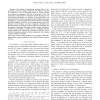Free Online Productivity Tools
i2Speak
i2Symbol
i2OCR
iTex2Img
iWeb2Print
iWeb2Shot
i2Type
iPdf2Split
iPdf2Merge
i2Bopomofo
i2Arabic
i2Style
i2Image
i2PDF
iLatex2Rtf
Sci2ools
157
click to vote
INFOCOM
2012
IEEE
2012
IEEE
Delay optimal multichannel opportunistic access
Abstract—The problem of minimizing queueing delay of opportunistic access of multiple continuous time Markov channels is considered. A new access policy based on myopic sensing and adaptive transmission (MS-AT) is proposed. Under the framework of risk sensitive constrained Markov decision process with effective bandwidth as a measure of queueing delay, it is shown that MS-AT achieves simultaneously throughput and delay optimality. It is shown further that both the effective bandwidth and the throughput of MS-AT are two-segment piece-wise linear functions of the collision constraint (maximum allowable conditional collision probability) with the effective bandwidth and throughput coinciding in the regime of tight collision constraints. Analytical and simulation comparisons are conducted with the myopic sensing and memoryless transmission (MS-MT) policy which is throughput optimal but delay suboptimal in the regime of tight collision constraints.
Related Content
| Added | 28 Sep 2012 |
| Updated | 28 Sep 2012 |
| Type | Journal |
| Year | 2012 |
| Where | INFOCOM |
| Authors | Shiyao Chen, Lang Tong, Qing Zhao |
Comments (0)

